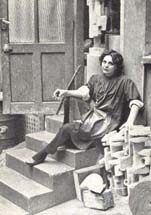Alicia Penalba facts for kids
Quick facts for kids
Alicia Penalba
|
|
|---|---|
 |
|
| Born | August 9, 1913 San Pedro, Argentina
|
| Died | November 4, 1982 (aged 69) Paris, France
|
| Nationality | Argentine |
| Known for | Sculpture, tapestry, weaver |
| Movement | abstract art |
Alicia Penalba (born August 9, 1913 – died November 4, 1982) was an amazing artist from Argentina. She was known for creating sculptures, designing tapestries, and weaving.
Contents
About Alicia Penalba
Alicia Penalba was born in San Pedro, Argentina, in 1913. When she was younger, she wanted to be a painter and drawer. But in 1950, while living in Paris, France, she decided to focus only on sculpture.
Her Unique Sculptures
Alicia Penalba became famous for her unique sculptures. She often made tall, organic shapes that looked like they grew from nature. She was inspired by other sculptors like Etienne Martin and Etienne Hajdu.
Her art is part of a style called non-figurative abstract art. This means her sculptures didn't look like real people or objects. Instead, they used shapes and forms to express ideas and feelings.
In the 1960s, her art changed a bit. She started making sculptures that were more horizontal. Alicia Penalba created many sculptures of different sizes. She is most famous for her very large, monumental pieces. You can find these big sculptures all over the world.
Famous Works Around the World
One of her most famous sculptures is The Great Double (also known as Le Grand Double). A version from 1962–1964 is in the sculpture garden at the Kröller-Müller Museum in the Netherlands. Another version from 1972 is outside the MGIC building in Milwaukee, Wisconsin, USA.
In 1974, Alicia Penalba was working in Pietrasanta, Italy. She encouraged another artist, Helaine Blumenfeld, to try sculpting with marble. She even introduced Helaine to a master carver named Sem Ghelardini. Alicia Penalba passed away in Paris in 1982.
Awards She Won
Alicia Penalba received several important awards for her incredible artwork:
- Prize from the Calouste Gulbenkian Foundation in Paris, France (1974)
- Special Prize at the Hakone First International Exhibition of Modern Sculpture in Ninotaira, Japan (1969)
- International Sculpture Prize at the Sixth Biennial in São Paulo, Brazil (1961)
See Also
 In Spanish: Alicia Penalba para niños
In Spanish: Alicia Penalba para niños

